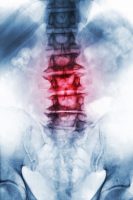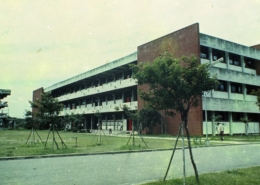Minimally invasive spinal surgery offers quick recovery and other advantages
Source: Dr. Chin-Chean Wong, Shuang Ho Hospital, TMU Healthcare System
A 76-year-old female patient suffered from severe lower back pain for many years, eventually with pain spreading to her hips and legs until she could not walk for more than 5 minutes. When she sought medical attention at various hospitals, all of the doctors recommended surgery, but the patient felt she was too old and worried about pain and safety issues associated with traditional surgeries. After a recommendation from a friend, she came to the orthopedics department at Shuang Ho Hospital of TMU Healthcare System, where an examination showed that her third to fifth lumbar vertebrae had spondylolisthesis, where bone spur hypertosis had led to severe compression of the spinal nerves.

Spine X-ray Picture from Getty Images
After Dr. Chin-Chean Wong explained his assessment, the patient decided to undergo minimally invasive spinal surgery. Her post-surgical recovery was good, and she is now able to resume dancing her favorite Japanese dances. With medical advances, minimally invasive spinal surgeries have also improved significantly. Using special equipment and imaging systems, these surgeries can avoid damaging the nervous system. Video or other guidance systems are used throughout the implantation procedure, which greatly enhances accuracy and safety.
Compared to traditional surgery, the advantages of minimally invasive spinal surgery are:
1. A smaller surgical wound, just the size of a 10NT coin
2. Less pain and blood loss during surgery
3. Quicker recovery: patients can typically leave their beds the day after the surgery
4. Shorter hospital stays: patients can be discharged 2-4 days after surgery
Dr. Chin-Chean Wong says many conditions can be treated with minimally invasive surgery, including nerve compression due to spinal stenosis, herniated intervertebral discs, thoracolumbar compression fractures, traumatic lumbar fractures and spondylolisthesis. Minimally invasive spinal surgery was introduced at Shuang Ho Hospital more than a decade ago and has been performed on several hundred cases, with many patients travelling from central or southern Taiwan to seek such treatment. In recent years, minimally invasive spinal surgery has also been used to treat spinal infections with good results. If you have any questions on spinal health or treatment, please discuss this with the Shuang Ho orthopedics department to receive the most suitable treatment method and plan.



















